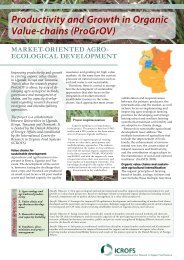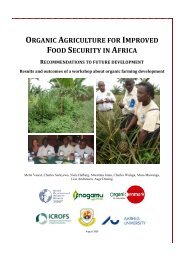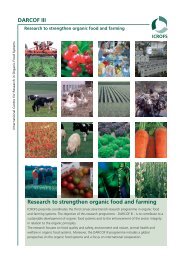The 2nd African Organic Conference â Mainstreaming ... - ICROFS
The 2nd African Organic Conference â Mainstreaming ... - ICROFS
The 2nd African Organic Conference â Mainstreaming ... - ICROFS
You also want an ePaper? Increase the reach of your titles
YUMPU automatically turns print PDFs into web optimized ePapers that Google loves.
2 nd AFRICAN ORGANIC CONFERENCE 2012<br />
May 2-4, 2012 in Lusaka, Zambia<br />
resources to support agricultural transformation, Infrastructure Development to support agricultural<br />
transformation and Mobilization.<br />
<strong>The</strong> model focuses on healthy and just farms, food systems, communities and environment by bringing<br />
people together for education, alliance building and advocacy. Collection of specific natural methods,<br />
which when applied to farming, produces results that are in harmony with the environment which include<br />
Land preparation, planting, management of crop growth, weed management, harvesting, storage and<br />
marketing. Soil conservation and management contribute about 60 % of the crop quantity and quality<br />
production. For efficient organic farming, the growers need to know much about soil.<br />
Mineral<br />
matter<br />
45%<br />
<strong>Organic</strong><br />
matte<br />
5%<br />
Air<br />
25%<br />
Water<br />
25%<br />
Air<br />
Water<br />
<strong>Organic</strong> matte<br />
Mineral matter<br />
Small holder farmers have doubled food production in a decade by using simple ecological methods and<br />
most efficient farming techniques. Scientific evidence demonstrates that organic methods outperform the<br />
use of chemical fertilizers in boosting food production where the hungry live –especially in unfavorable<br />
environments, headed. Soils productivity and crops protection against pests have greatly improved by<br />
natural environment such as beneficial trees, plants, animals and insects, according to the local studies.<br />
Agro-ecological projects in IRTECO intervention areas have shown an average income increase of 60 per<br />
cent.<br />
SYSTEM&OF&RICE&INTENSIFICATION:&CASE&STUDY&OF&A&RICE&CULTIVATION&METHOD&FOR&<br />
INCREASING&RICE&GRAIN&YIELD&THROUGH&BETTER&MANAGEMENT&PRACTICES&AND&<br />
ORGANIC&AGRICULTURE&<br />
Abstract<br />
Several innovations have been made in rice cultivation in order to increase grain yield and[ ]better meet the<br />
world’s food demand. <strong>The</strong> “Green Revolution”[ ]which was one such accomplishment has undoubtedly<br />
contributed to a tremendous yield increase in Asia, where many farmers were able to afford the new<br />
technology. However, it failed to help many farmers in Africa, where farmers are constrained by their<br />
limited financial resources and which is characterized by an immense variability of agro-ecological<br />
conditions. While plant growth and productivity are known to derive from the interaction between genetic<br />
potential (G) and environmental factors (E), efforts to improve rice production have usually focused on<br />
making changes in G, assuming a standard E that is created by conventional rice-growing practices.<br />
Genotypes have been assessed for their performance in continuously-flooded paddy soils, with optimallydense<br />
plant populations, with reliance on inorganic fertilization to raise yields.<br />
28<br />
BOOK OF ABSTRACTS





